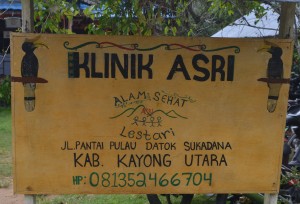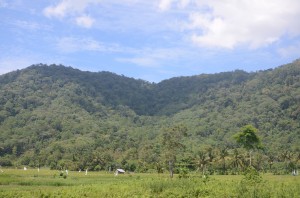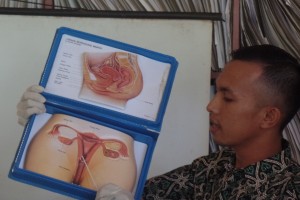Making ‘Radical’ the Path to Empowering People and Nature
Mar 7th, 2016 | By admin | Category: FeaturedBy Suzanne York, www.transition-earth.org.
Amazing things can happen when local voices are heard.
In a remote pocket of the island of Indonesian Borneo, a small organization is working with the local community to link the issues of human health and protecting a fragile environment in an effort to build a brighter future. As the world recognizes International Women’s Day on March 8, it is more than worth noting that this is a women-led organization.
The work is being spearheaded by Alam Sehat Lestari, which translates into “health and nature everlasting” and goes by the initials ASRI. It is creating change for good through a process its organizational founders refer to as “radical listening.” Perhaps what is most radical about this approach is that the voices of the community have been listened to loud and clear.
“Saving the Rainforest with a Stethoscope”
In the southwest pocket of Borneo (or Kalimantan, as it is known in Indonesia), sits the community of Sukadana. The town is adjacent to Gunung Palung National Park, home to an array of diverse nature, with 2,500 orangutans, and approximately another 2,500 orangutans just outside park boundaries. The park is under threat from illegal logging, which has been taking place for a number of years. In 2015, rapid clearing of forests in Borneo for wood and palm oil plantations contributed to horrific fires that threatened nature and human health.
ASRI’s founders – Dr. Kinari Webb, Dr. Hotlin Ompusunggu, and Dr. Antonia Gorog – spent hundreds of hours in talks with community members to understand their needs. Though many people valued the park, the only way to meet their basic needs was to log the forest. Poverty was – and still is – the driving force, even though the community knew that the Gunung Palung forest is their watershed and is needed to grow rice and other crops, and without it they would face more floods and disease. For most of the local people, they have an income of less than $1 a day, and illegal logging is their best option.
By implementing their radical listening approach, ASRI’s women leaders heard the community ask for health care, ambulances, mobile health clinics, and organic farming. ASRI also saw that using an integrated health and environment development model was needed. According to Dr. Ompusunggu, the clinic was created to address short-term needs for long-term well-being for the people and also for nature.
The ASRI leaders call it “saving the rainforest with a stethoscope.” ASRI came up with a plan to offer a variety of payment options for healthcare services. This includes cash of course, but also paying with seedlings (to support reforestation), handicrafts, labor, and even organic manure. This flexible payment plan offers options people didn’t have before and is getting healthcare to those who need it most.
The clinic provides both medical and dental health services, which includes eye care, immunization, and birth control. In the crowded waiting area, ASRI staff give weekly health and environmental conservation presentations as people wait for their appointment.
Family planning features prominently in the public education programs. Injections are popular, and intrauterine devices (IUD) are becoming more popular, though local mid-wives say there is still some fear around using IUDs. (For a video of an ASRI nurse explaining how an IUD works, go here).
In the Sukadana region, families have an average of 2-3 kids. Midwives report that most people know about family planning, and sex education is given to seniors in high school. The midwives, however, would like to see more spacing between births; ideally, 5 years.
ASRI, in conjunction with their partner Health in Harmony, will be opening a community hospital and training center to meet growing demand for their services and also to provide surgical and emergency facilities.
Community Power
Indonesia is the world’s fourth most populous country. The nation just hosted the International Conference on Family Planning this past January, and has had a successful family planning program, but the program has recently stalled at the local level. Prior to the conference, Dr. Surya Chandra Surapaty, head of Indonesia’s National Population and Family Planning Board, penned an article on revitalizing the nation’s efforts on family planning. He wrote, “In an ever-growing world, our shared future depends on commitments at the global level, and the local action required to turn these into reality. If we truly wish to ensure universal access to contraception and reproductive health care services in our lifetime, then we must begin by effecting change in our own communities.” (emphasis added)
This is exactly what the women and men of ASRI are doing for the community of Sukadana and the local environment, and doing quite well. Their dedication to providing quality healthcare for everyone and long-lasting plans to protect the environment should be an inspiration and a blueprint for others to follow.
More to come about the work of ASRI in future posts.
Suzanne York is Project Director of Transition Earth. She visited the ASRI clinic in November 2015 with the Sierra Club’s Global Population and Environment Program and Health in Harmony.



